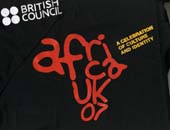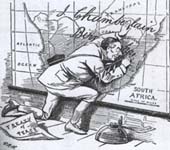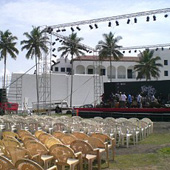










Alex Smith
Amanze Akpuda
Amitabh Mitra
Ando Yeva
Andrew Martin
Aryan Kaganof
Ben Williams
Bongani Madongo
Chielozona Eze
Chris Mann
Chukwu Eke
Chuma Nwokolo
Colleen Higgs
Colleen C. Cousins
Don Mattera
Elizabeth Pienaar
Elleke Boehmer
Emilia Ilieva
Fred Khumalo
Janice Golding
Lebogang Mashile
Manu Herbstein
Mark Espin
Molara Wood
Napo Masheane
Nduka Otiono
Nnorom Azuonye
Ola Awonubi
Petina Gappah
Sam Duerden
Sky Omoniyi
Toni Kan
Uzor M. Uzoatu
Valerie Tagwira
Vamba Sherif
Wumi Raji
Zukiswa Wanner
![]()
Credits:
Ntone Edjabe
Rudolf
Okonkwo
Tolu Ogunlesi
Yomi Ola
Molara Wood
![]()
 |
||||||||||||
Manu Herbstein
|
||||||||||||
| Reflections in a Shattered Glass | ||||||||||||
In
Ghana the British Council celebrates the Bicentenary of
After an abortive attempt to mark the Bicentenary by having Oprah Winfrey beam her television chat show from Ghana the Ghana@50 Secretariat is reported by the British Council to have asked the same British Council to collaborate with it in developing a program for an event at Elmina Castle on 25th March 2007.
|
||||||||||||
All
at sea in Cape Coast On 14th February 2007 he visited Elmina Castle, of which he said later, “(It) stands as an evocative monument to the inhumanity of slavery . . . a monument of man’s inhumanity to man. It should be a place of pilgrimage for us all.” The British bought Elmina Castle from the Dutch in 1872, 65 years after the Act of 1807. They did not ship a single slave from Elmina Castle. Mr. Prescott spent the next morning in Cape Coast,
which is just 15 km from Elmina. The British were intimately connected with Cape Coast Castle through a period of nearly 300 years, from 1664, when they captured it from the Dutch, until Ghana’s independence in 1957. Indeed from 1874 to 1877 it was the seat of the colonial government. More to the point, in the years up to 1807, it was the centre of the British slave trade in West Africa. Several hundred thousand enslaved Africans were at one time or another incarcerated in its underground dungeons, chattel cargo awaiting shipment. In the last twelve years of the legal slave trade, the British government paid over one million pounds to buy some 13,400 African men, who became the slave-soldiers of the West India Regiment. They went so far as to delay the implementation of the 1807 Act in order to make one last legal purchase. These are mere fragments of a brutal history. One can only speculate on the reasons for Prescott’s failure to visit Cape Coast Castle. |
||||||||||||
 |
||||||||||||
The British
Council T-Shirt |
||||||||||||
Free baubles and the symbolic nature of maps Next stop for Mr. Prescott was the British Council headquarters in Accra, where he launched a programme called Africa 2007 before a large audience of invited guests, including Ghana’s Vice President, Alhaji Aliu Mahama. Every guest was presented with a package of gifts: a key-ring, a cheap plastic desk-tidy and a tee-shirt. Each of these bore the programme’s brand icon, an implied map of Africa inscribed with the red letters africaUK07. The tee-shirt’s label showed that it had been manufactured in Nicaragua by a firm which has in the past been criticized for unfair labour practices. No doubt the Council tried, but failed, to identify a suitable supplier within the African continent. The image calls to mind European explorers’ obsession with mapping the African continent. We owe our knowledge of the outline shape to Portuguese mariners. The mapping of the interior was an essential prelude to the imperialists’ appropriation of territory which was not theirs. At the turn of the last century, this obsession was famously captured by Edward Linley Sambourne’s 1892 Punch cartoon, The Rhodes Colossus, in which a giant Cecil John Rhodes, with his head in the clouds, plants his right boot firmly on the Cape and the left in Egypt. This Cape to Cairo image was proudly displayed in colonial school textbooks. In another Punch cartoon of the period, the British Colonial Secretary, Joseph Chamberlain, is seen triumphantly celebrating the British victory in the war to control the sub-continent’s gold and diamond resources, by inscribing his signature across the map of South Africa. Was the British Council aware of the ideological antecedents of its africaUK07 brand image? Again, one can only speculate.
In the invitation to the second event in the British Council’s programme, the letters inscribed in the imaginary map have changed: they now read “reflections.”
The venue is the courtyard of Elmina Castle, the date 25th March 2007, two hundred years to the day after the passing of the Act. The special guests of honour are John Agyekum Kufuor, President of the Republic of Ghana, and Baroness Valerie Amos, Leader of the British House of Lords. We are promised “a creative and shared artistic experience that reflects on the past, the present and the future.” I wrote to the Director of the British Council in Accra, declining to accept the invitation on two grounds. Firstly, given that this was a celebration of British history, the venue should have been Cape Coast Castle, not Elmina. Secondly, limiting consideration to the “past 200 years” gave the British Council’s guests little choice but to participate in, and so condone, an act of collective amnesia. In his reply the Director regretted that I had “translated (the) invitation text literally.” What television viewers saw was a variety concert, beamed from start to finish. Speeches by the guests of honour were followed by a succession of performances, some by celebrities, some by lesser-known artistes. On a large screen an image of the British Prime Minister at the time, Tony Blair, delivered his much-criticized recorded address. The concert continued after dark, outside the castle walls, for the benefit of those for whom there was no space in the courtyard.
Its exploration revealed little or nothing. In particular, no mention was made of two critical events which marked the imperial history of this site during the period selected by the Council. Two illustrations from the Illustrated London News recall the scene on June 13, 1873. Christopher DeCorse describes the first of these pictures: “This view is looking east from the inside of the Benya lagoon. Elmina Castle and the town appear on the right and Fort St. Jago on the hilltop to the left.” DeCorse explains the background:
A contemporary report picks up the tale:
A British squad “ . . . passed with burning torches along the beach, and set fire to the thatched roofs of all the houses on that side. In half an hour the whole “Kings Town” of Elmina was in flames. Its destruction . . . was summary and complete.” This illustration, dating back to the seventeenth century, shows that the Edina the British razed was a town of some antiquity and substance. At the time of its destruction its population was about fifteen thousand. The British exiled the Omanhene of Edina, Nana Kobena Igyan, to Sierra Leone for refusing to recognize their authority. The area where the town once stood has remained bare since that day. The outdoor seating for the March 25th function was placed where houses of the town once stood. The only mention the British Council made of these events was a report in its on-line newsletter dated April 31, 2007:
The British Council named the final section of
its programme, “Here and Now - We have returned! We have arrived!”
|
||||||||||||
 |
||||||||||||
 |
||||||||||||
Guests at Elmina |
||||||||||||
 |
||||||||||||
Elmina Castle, mid-17th
Century |
||||||||||||
 |
||||||||||||
The
Bombardment of Elmina |
||||||||||||
Barbarous chiefs, savage rulers, great assassins
and On the flat roof of Elmina Castle there are two small, separate rooms, which the tour guides refer to as Prempeh’s apartments. In 1895, the Asantehene, Prempeh I, sent an embassy to London under the leadership of the brothers John and Albert Owusu-Ansah, in a desperate attempt to bypass the hostile Governor at Cape Coast and persuade Queen Victoria’s government not to invade his country. Joseph Chamberlain, the Colonial Secretary, refused to see the delegation. The British subsequently imprisoned the brothers, back in the Gold Coast, on a trumped-up charge of forgery. The invasion went ahead. The Asante, weakened by years of civil war and intimidated by the reputation of the Maxim gun, did not resist. The expeditionary force entered Kumase and on Monday 20th January, 1896, abducted the Asantehene. Prempeh was brought to Elmina Castle, together with an entourage of family and elders. Asante was an independent state. It was not at war with Britain. The British described their action as arrest and deportation; but how did they justify it in law? They could not. Three days later, on 23rd January, the Governor of the Gold Coast Colony, William Edward Maxwell, Esquire, C.M.G, caused to be passed in the Legislative Council, Ordinance no. 1 of 1896, conferring on himself “the necessary power for the detention and deportation of certain Political Prisoners.”
Clause 1 legalizes acts “done, permitted to be done, or sanctioned by the Governor . . . prior to the passing of this Ordinance.” “No proceeding,” it tells us, “calling in question the legality of such acts shall have any effect whatsoever.” Maxwell did not sign the Ordinance until 3rd February, 1896, two weeks after the abduction. The British subsequently sent Prempeh to Freetown and then to the Seychelles. They did not allow him to return to Kumasi until 1924. The Colonial Secretary, Joseph Chamberlain described these events thus:
He told his Permanent Undersecretary, Sir Robert Meade,
That is not the end of the story. Edward Ayensu tells us:
The Ashanti Goldfields Corporation shipped the first consignment of gold from its Obuasi mine in July, 1898. During the following fifty years the mine yielded some six million ounces of the precious metal. An Amazing Disgrace: The movie Amazing Grace was made by Walden Media. Walden Media is owned by Philip Anschutz. Forbes magazine rates Anschutz as the 31st richest man in the United States of America. He is worth at least five billion U.S. dollars, spread through some 100 companies in land, oil, farming, railroads, telecommunications, gambling, newspapers and entertainment. He is a strong supporter of George W. Bush and the Republican Party, opposes gay and lesbian rights and supports the teaching of “intelligent design” in American schools. Anschutz controls some six thousand movie screens in the U.S (nearly one-fifth of the total) and determines what may or may not be shown on them. Forbes rates him the “greediest executive in America” and the BBC has described him as a “corporate vulture.” He is a strong supporter of conservative Christian causes. The movie Amazing Grace purports to show how the great white Christian hero, William Wilberforce, almost single-handedly, against great odds, freed Africa from the scourge of the slave trade. It is a clever confidence trick, a piece of propaganda masquerading as history but so full of falsification that it is best regarded as fiction. The historian Peter Linebaugh has demolished any pretensions this movie might have had to historical accuracy. I have borrowed my sub-heading from his review, which deserves a lengthy quote:
The third British Council event commemorating the 1807 Act was billed as the African premiere of Amazing Grace. At the request of the British Council, Walden Media supplied the film free of charge and sent the reel direct from U.S. The net cost of the screening at the National Theatre was about £4,500. Walden Media explains its generosity thus:
In his introductory remarks, the Director of the British Council expressed the hope “that tonight we will inspired by the film to make Amazing Changes, first and foremost in our own lives (as individuals), then our families, our communities, our nations and who knows, the world.” He expressed his thanks to Walden, “whose passion and vision for what Amazing Grace represents led to the donation of the film.” The British Council’s Communication Manager introduced her report of the function with a quotation from Wilberforce:
“Tickets for the show,” she tells us, “were sold out by noon on the day of the premiere leaving the Accra National Theatre, with a seating capacity of 1500, packed beyond our wildest dreams. There wasn’t an empty seat in the house! . . . For the audience . . . the film provided a strong narrative of the life of the once young politician turned radical God-centered Christian and how his deep spirituality helped to change the moral outlook of Britain at the beginning of the 19th century. Clad in Hollywood style frocks, tuxedos and black ties, guests were treated to a red carpet entrance, home-made buttered popcorn, ‘New York’ style hotdogs and creamy vanilla ice-cream to add to the evening’s authentic ‘going to the pictures’ feel.” “At the end of the evening . . . the audience held hands with baited breath. . .” and resolved “ . . . to change the world we live in and leave it a much better place than we met it.” Many of the audience were schoolchildren. Given that history is now merely an optional subject in Ghanaian senior secondary schools and subsumed in other disciplines at junior secondary level, Amazing Grace may be all that many of these children will ever learn about the slave trade. Evasion, concealment, propaganda
and false modesty. Did the British Council bureaucrats know what they were doing? Shall we be charitable? Were they perhaps the unwitting victims of their own ignorance, so that we may fairly charge them with no more than insensitivity or, perhaps, intellectual sloth? The truth is rather that their actions were fully consistent with the ideology of their employer (and by extension, with that of the Foreign & Commonwealth Office; and by further extension, with that of the former Prime Minister Tony Blair and his New Labour Party and government.) The British Council is the UK's principal agency for cultural relations abroad and an integral part of the UK's overall diplomatic effort. The Secretary of State for the Foreign & Commonwealth Office is answerable to Parliament for the policies, operations and performance of the Council; the appointment of the Director-General is subject to the Secretary of State’s approval. Apart from acting as an evangelist for the English language through the provision of libraries, the Council’s functions include:
The Foreign & Commonwealth Office provides strategic guidance to the Council and ensures that the Council’s objectives and priorities are compatible with its own. It partly funds the Council’s activities Research commissioned by the Council reported finding “. . . evidence that perceptions of the UK among young people in sub Saharan countries is dated and negative.” The Council’s consultants recommended activities that would, “reinterpret and celebrate the shared heritage between the UK and Africa.” The Council’s target audience is “teachers and youth community leaders able to influence interests and development of young people” and “those in positions of influence and power” who, the Council hopes, “will be inspired . . . to advocate further change and partnership with the UK.” These “leaders and influencers” are expected to collaborate with the Council in implementing project activities, from which they may expect to be direct beneficiaries. “Relationships brokered by the British Council broaden the international view of young people.” The Council will measure its success by the extent to which it succeeds in effecting a “change in understanding of young people in Africa of the UK and of those in the UK of Africa.” The Council plans to
The Council assures us that its project “. . . does not offer a triumphalist approach – look how well the UK did . . .” But the truth is that the UK did do extremely well, out of the slave trade and out of its Empire. I give Jacques Depelchin the last word:
|
||||||||||||
 |
||||||||||||
The Punch Rhodes Colossus |
||||||||||||
 |
||||||||||||
Day After |
||||||||||||

